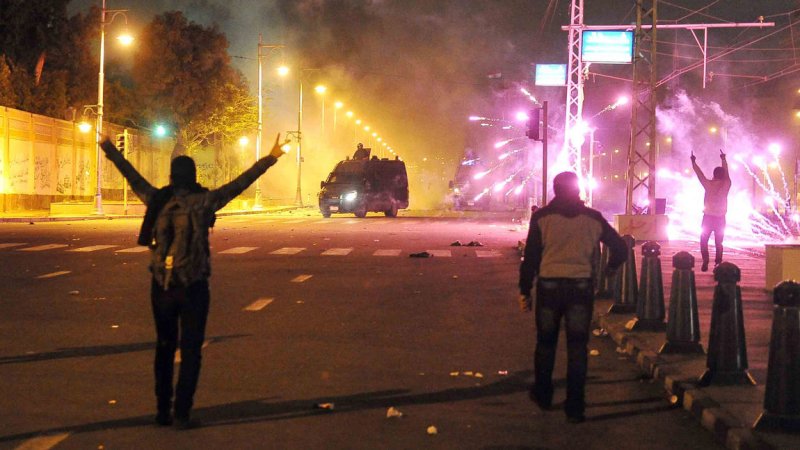1 of 8 | Egyptian protesters gather in front of the presidential palace in Cairo, in Egypt, on February 1, 2013. as people took to the streets across the country in a show of opposition to Morsi and his Muslim Brotherhood. Egyptian security used water cannon and fired shots into the air as protesters threw petrol bombs and stones into the grounds of the presidential palace, an Presidential spokesman said. UPI/Ahmed Jomaa |
License Photo
CAIRO, Feb. 1 (UPI) -- Protesters threw rocks and Molotov cocktails Friday in another round of demonstrations against Egyptian President Mohamed Morsi.
At least one person was killed in a clash outside the presidential palace in Cairo and dozens injured across the country, Ahram Online reported. The protests follow the deadliest week of violence -- more than 60 people died -- since Morsi took office.
The new round of protests began in Port Said after 21 people were sentenced to death for participating in violent soccer riots that killed 74.
Morsi's office issued a statement blaming "violent anarchists" for the protests. The president has declared a state of emergency but has so far failed to quash the demonstrations.
Mohamed ElBaradei, the former head of the U.N. nuclear watchdog agency and head of the Constitution Party and National Salvation Front, urged the opposition via Twitter to be peaceful, reminding protesters of the demonstrations that ousted President Hosni Mubarak.
"We brought down Mubarak's regime in a peaceful revolution, and we insist to achieve its objectives in the same way, no matter what the sacrifices are or the brutal methods of repression," he said.
Thousands of people marched in the rain Friday in Port Said, chanting, "With our soul and blood, we will defend you, Port Said," Ahram Online reported.
Protesters marched to Tahrir Square in Cairo and staged rallies in Alexandria.
Human rights officials expressed concern over an increase in sexual violence against women in Cairo since the latest protests began, the BBC said.
The U.N. Office of the High Commissioner for Human Rights said 25 women have been sexually assaulted, mainly in Tahrir Square.
Michelle Bachelet of the U.N. Entity for Gender Equality and the Empowerment of Women unit said she was "deeply disturbed by the gravity of [the] recent attacks."
The current unrest began Jan. 24 in Cairo on the eve of the second anniversary of the 2011 revolution that toppled dictator Hosni Mubarak.
Protesters accuse Morsi, a member of the Muslim Brotherhood, of imposing a new form of authoritarianism and turning his back on the values behind the uprising.
Morsi's supporters said his detractors are trying to use the power of protest to oust Egypt's first democratically elected leader.
Egyptian army chief Gen. Abdul Fattah al-Sisi Tuesday warned the degenerating situation could lead to the collapse of the state.















